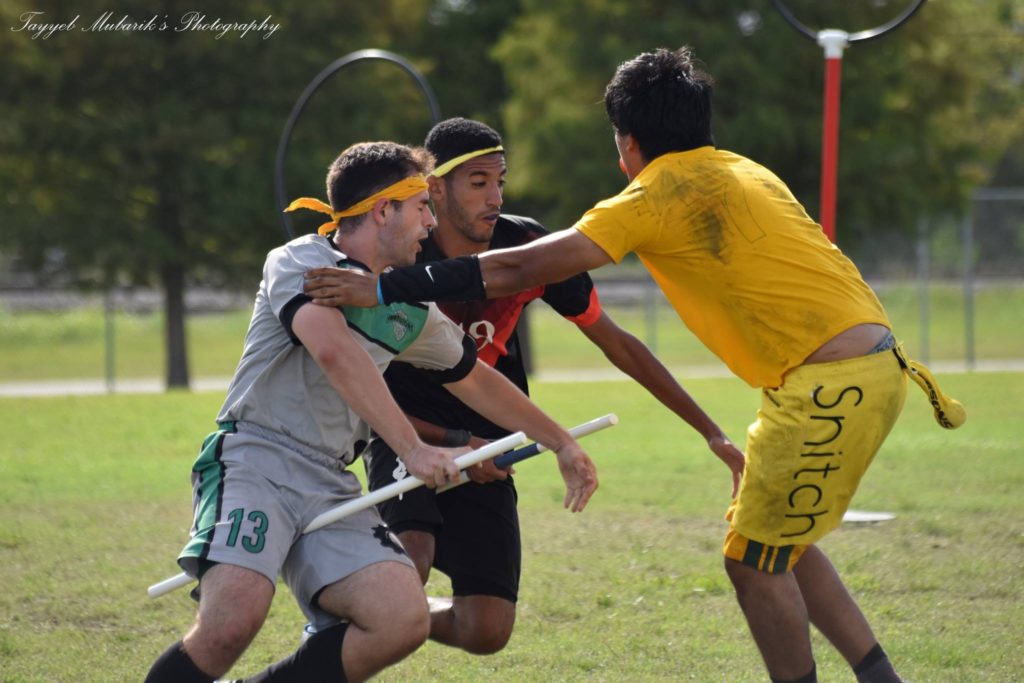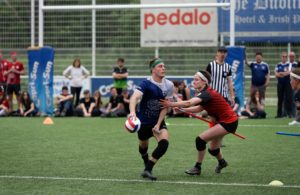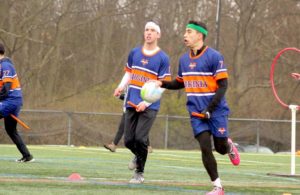- Rule, Britannia, no more?
- Unpopular Opinions: US Quadball Cup 2023
- Proven Contenders: University of Virginia
- Proven Contenders: Rutgers University
- Proven Contenders: University of Michigan
- Proven Contenders: Creighton University
- Different Perspectives: A Look Inside USA Ultimate
- Antwerp QC, Much of Belgian Core, Leaves Competitive Quidditch
Oelze Reacts to SWRC
- By Kevin Oelze
- Updated: February 24, 2017

Credit: Tayyeb Mubarik
AMAZING GARCE-Z
I worry about the future of competitive quidditch.
I’m sure I’m not alone, people have recognized many of the problems, but I think there’s one problem lurking that no one seems to be talking about. However, this problem threatens the competitive integrity of every tournament it touches, possibly even affecting regional championships, US Quidditch Cups and MLQ Championships. In order to protect the integrity of the game, there is one and only one thing USQ and MLQ can do: effective immediately, Gabe Garcez must be banned from snitching.
Of course, that last suggestion isn’t serious in the least. Garcez is, by all accounts, the best snitch the game has ever seen and has a long historical track record and data to prove it. It’s an incredible testament to his abilities. However, his presence in a game is quite literally unfair. In all snitch-range games recorded so far in USQ standings, games have lasted an average of just over 20 minutes. In his first nine snitch-range games of the Southwest Regional Championship, Garcez’s games lasted an average of 34 minutes and 15 seconds, which is good for eight times as large as the median time a snitch lasts with snitch on pitch, according to USQ’s last standings update. At that point in the tournament, his average time to being caught was longer than the slowest average time to catch a snitch of quite literally any team in the country. Or, explained more strikingly, the difference between going from a mediocre snitch to Garcez in a game is roughly the difference between having Harry Greenhouse seeking for your team and me seeking for your team after two years of not playing competitive quidditch on a day where I ate an entire box of Krispy Kreme donuts. In my defense, my career record at seeker is pretty good.
This isn’t to say that Garcez is the only great snitch in quidditch, or he does anything other than snitch fairly by the rulebooks. I absolutely don’t actually want him banned, as much fun as the misdirection was. My point, instead, is that quidditch with Garcez as a snitch is actually a fundamentally different game than it is with an average snitch.
At one point in the Southwest Regional Championship final, with roughly 5 minutes elapsed with the snitch on pitch, Texas State University held a 30-point lead over Lone Star Quidditch Club, putting them on the precipice of pulling out of snitch range. A mere 7 minutes, 30 seconds later when Lone Star pulled, the score had switched, and Lone Star held a 20-point lead. Texas State generally looked like the better team before the snitch was released and, with the snitch, the opposite was true. What this essentially means is that a tournament director, in assigning snitches to games, can heavily influence the outcome of a game. This is super alarming to me. I think Garcez is a great snitch–in fact, he is one that every snitch should aspire from which to learn. I just wish the gulf between elite snitches and average snitches was not so big, because these things do influence the outcome of games.
FOUR SCORE AND SEVEN YEARS AGO
In Abraham Lincoln’s famous Gettysburg Address, he uses this iconic phrasing for a period of 87 years. For me, well, I mostly use it as how long it’s been since scores have been updated. Obviously, I’m exaggerating a tiny bit here, but my point is as such: tracking down the scores of quidditch tournaments as or after they happen is harder than it has ever been in modern quidditch.
The Southwest Regional Championship final had been over for almost three hours, and I still couldn’t find a single mention on Facebook of Lone Star’s victory. Instead, I could find it on Texas State’s lovely Twitter account, and it was live-tweeted on the USQScores account. The official Google spreadsheet which was promoted as the best place to get live updates did not have the score or winner of the finals input even 48 hours after the tournament’s conclusion. For most tournaments, the best hope of finding scores is in a Facebook post in a group, and even that’s only if you’re lucky. There is no consistent way of finding results of games. Volunteers have stepped up and tried before, but it’s a heavy workload and nobody seems to have the energy to do it long term.
I’m not here to attack volunteers who are trying to help, and, yes, having more volunteers does help on that–although accusing a player’s parent of bitching when they try to find scores does not. Really, what I’m here to attack are two things (since I defended USQ in my most recent article, I figured I should at least somewhat return to form): our philosophy on score reporting and the technical limitations of USQ’s website.
We seem to think that the standard for major USQ tournaments of “just have a spreadsheet whose link gets shared around” is acceptable. It’s not. It looks woefully unprofessional but, most importantly, it’s completely inaccessible for anyone not already linked to the quidditch community in some way. If I’m a resident of College Station who had seen some advertising for quidditch and went to USQ’s website to try to get information about the tournament–such as, if I were particularly interested in Texas State and wanted to know when they played–I’d have no way to find this. The USQ website is written so players can find information they need–though that tends to be disseminated on Facebook–but there is nowhere fans or anyone interested can get any specific information other than the location and time of the event. Results are weeks and weeks out of date. News about events and recaps are almost completely outsourced to third-party websites.
Of course, this is not really the fault of the volunteers or people trying to do all of this. In reality, in order to accommodate any of this, development would need to be done on the website. For anyone who has tried to get professional development done before, it is expensive, and USQ has mostly survived with this because people have been willing to donate time and expertise to do this. However, this is really unsustainable. I know USQ does not have a ton of money coming in, but I feel like it would be a very reasonable investment to try to find some way of improving and updating the website. Having it so that the website could be an easy source of truth of scores and results that could actually be viewed by interested parties and used by tournaments could be a tremendous help. As it is right now, this source doesn’t exist. As much as people get excellent archeology training digging through all of the possible locations for scores, making it easier and better to access this information is a worthwhile investment that USQ could make.
Related Posts
About Kevin Oelze
Kevin is the co-founder and technical director of The Eighth Man. In his off time, he masquerades as a software engineer, and actively participates in karaoke duels. Despite the rules calling for Jason Mraz-only duels, his go-to song is ""Brighter than Sunshine"" by Aqualung.



